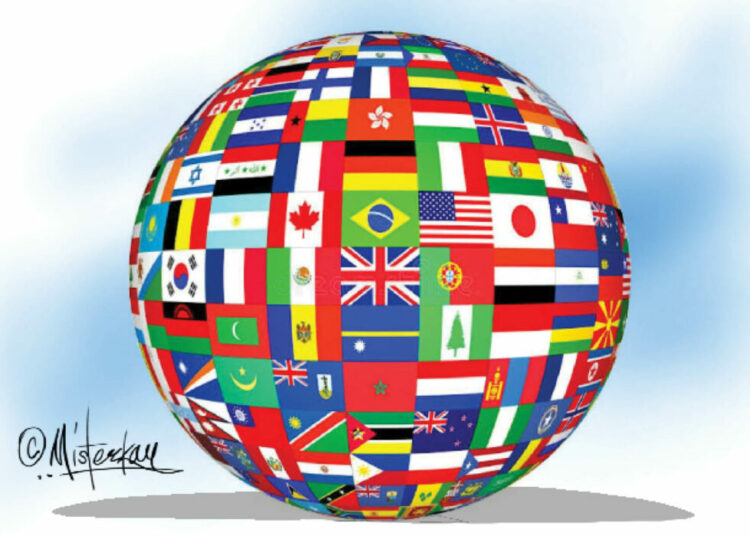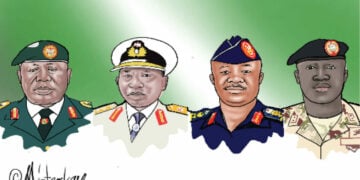Foreign policy was once a coveted statecraft: subtle negotiations, strategic alliances, and a quiet dance between cooperation and rivalry. It was about doctrine, principle, and projection of national interest within a predictable rules-based order. Today, the global landscape now feels like a chaotic scene where the lines between diplomacy and brute interest are blurred. Are we witnessing the death or perhaps the dearth of foreign policy as we knew it? Today’s crises are subtly rewriting the rules of diplomacy.
Foreign policy used to unfold over decades. The Cold War’s containment strategy, the European Union’s gradual integration, or Africa’s post-colonial non-alignment all rested on long arcs of history. Now, governments seem unable or unwilling to commit to grand strategies. Instead, we are in the era of instant foreign policy characterised by tweets that trigger trade wars, sanctions imposed overnight, or alliances shifted by a single election.
Consider the United States: once the architect of liberal internationalism, now oscillating between global leadership and isolationism with each administration. The recent shifts over NATO funding, UN funding, Middle East policy, and climate commitments have left allies second-guessing Washington’s staying power. This is not unique to the U.S.; in the UK, Brexit redefined its foreign relations with little long-term clarity on its post-EU identity while aid has dipped globally.
Sadly, multilateralism suffers. The World Trade Organization, the UN Security Council, even regional blocs like ECOWAS or ASEAN, now often resemble debating societies more than decision-making bodies.
Diplomacy vs Brute Interest
The Russian invasion of Ukraine in 2022 was not merely a European security crisis; it marked a tectonic shift in how foreign policy is conducted. The old post-Cold War assumption that territorial conquest was largely off the table was shattered. Western nations, in turn, rediscovered the language of sanctions, arms shipments, and realpolitik.
But the war also exposed the limits of Western influence. Much of the Global South refused to take sides, preferring neutrality or hedging for economic advantage. India bought discounted Russian oil even as they deepened security ties with the U.S. Africa saw a flurry of both Russian and Western diplomatic overtures, each camp seeking influence amid food insecurity and energy crises.
This “Ukraine effect” has normalized a foreign policy that is reactive, military-heavy, and often transactional. Diplomacy has been demoted from first resort to postscript. The West’s struggle to rally a truly global coalition revealed a sobering truth: influence is no longer dictated by morality or alliance alone, but by pragmatic calculation.
In the Middle East, the contradictions of contemporary foreign policy are even starker. The long-standing U.S. role as guarantor of security is eroding, yet no clear successor has emerged. The Abraham Accords brought historic rapprochement between Israel and several Arab states, but the devastating Gaza war and its ongoing fallout have reignited tensions, tested alliances, and inflamed public opinion across the Arab world.
Regional powers such as Iran, Saudi Arabia, Turkey, and even non-state actors like Hezbollah and the Houthis now shape regional dynamics as much as or more than external superpowers. China has stepped in as a broker of détente, notably in the Saudi-Iran rapprochement, while Russia maintains a disruptive presence in Syria and elsewhere.
What we see here is less “foreign policy” and more a patchwork of expedient arrangements: energy deals today, drone strikes tomorrow, ceasefires that collapse overnight. The line between diplomacy and warfighting is now fluid.
For Africa, the death of foreign policy has been a double-edged sword. On one hand, the decline of rigid ideological blocs has created space for diversification of partnerships. China builds infrastructure, Russia offers arms and mercenaries, the U.S. and EU push for governance reforms, Turkey and the Gulf states invest in trade and faith diplomacy.
On the other hand, this multipolarity has also resurrected a neo-colonial scramble, where foreign interests prioritize resource access and geopolitical footholds over genuine development. Coups in the Sahel—Mali, Burkina Faso, Niger—have been met not with coordinated diplomacy but with competing overtures: Moscow on one side, Paris recalibrating on the other, ECOWAS divided within.
Foreign policy towards Africa increasingly resembles a marketplace: who offers the best price, the most forgiving terms, the fewest conditions? The continent risks becoming an arena of external rivalries rather than a driver of its own foreign relations.
Trade, Tech and New Battlegrounds
Traditional foreign policy revolved around borders and wars. Today, the battlegrounds are also digital, financial, and regulatory. Technology, especially artificial intelligence, data sovereignty, and cybersecurity, is now a core arena of statecraft. The U.S.-China rivalry over semiconductors, TikTok, and 5G is as consequential as their disputes in the South China Sea.
Trade wars, too, have blurred the lines between cooperation and confrontation. The weaponization of supply chains during the pandemic, export bans on rare earths, or the EU’s carbon border tax reflect a world where economics is a tool of foreign policy, not its separate domain.
Even climate change has entered this calculus: who funds the energy transition in Africa? Who controls the lithium and cobalt mines for electric vehicles? Who writes the rules for carbon markets? This merging of domestic industrial policy and foreign policy has created a new doctrine: every nation for itself, but under the guise of global good.
Perhaps the clearest sign of foreign policy’s decline is the hollowing out of multilateral institutions. The UN struggles to resolve conflicts in Sudan, Haiti, or Myanmar. The World Health Organization was caught between rival powers during the COVID-19 pandemic. The African Union often issues strong statements but lacks the enforcement muscle to compel member states.
Meanwhile, ad hoc groupings like BRICS, G20, Quad and AUKUS fill the gap, often reflecting the priorities of a few powerful members rather than the collective interest. These flexible arrangements can be effective in the short term, but they undermine the predictability and universality that traditional foreign policy once prized.
In this fluid world, collaboration often resembles collusion. Deals are struck not on shared principles but on shared vulnerabilities. Europe’s gas dependence on Russia before 2022, Africa’s reliance on Chinese debt, America’s uneasy ties with Saudi Arabia, each reflects a bargain that ignored long-term consequences for short-term gain.
Human rights, once the moral veneer of foreign policy, is now a selective instrument. Sanctions are imposed on some autocracies but waived for others; arms are sold to allies regardless of their domestic crackdowns. The public, more informed than ever through social media, sees this hypocrisy and trust in “diplomacy” erodes further.
Can Foreign Policy Be Revived?
Is this truly the death of foreign policy, or merely a transformation? History suggests the latter. The rules of the 20th century were themselves products of upheaval, World Wars, decolonization, the Cold War. We may now be in the birth pangs of a new order, one that is more multipolar, less hierarchical, and more transactional.
To revive a meaningful foreign policy, nations will need to recommit to diplomatic consistency, investment in diplomacy, regional agency especially in Africa, Latin America, and Asia, and transparent alliances.
We live in an in-between age, too interconnected to retreat into isolationism, too divided to build a truly cooperative order. Foreign policy is not dead, but it is diminished, adrift between the old certainties of great-power blocs and the emerging realities of fragmented interests.
fThe challenge for the next decade is to restore a sense of purpose to diplomacy not as a footnote to war or trade, but as the first tool of statecraft.





